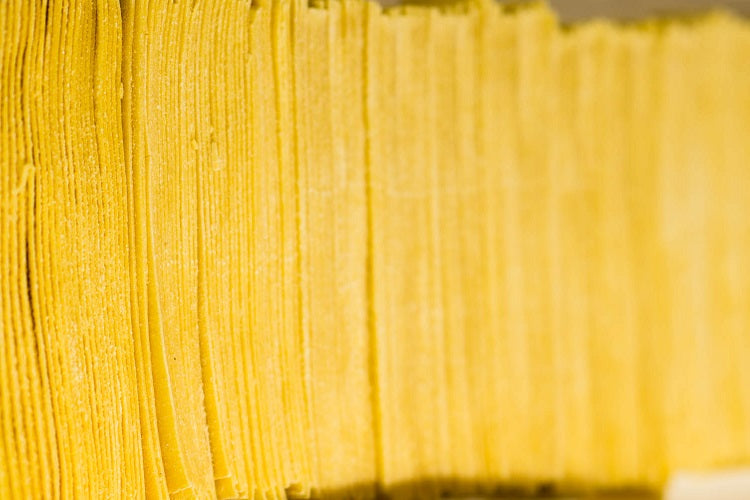
“Chi guarda a maggioranza spesse volte s'inganna: grane di pepe vince per virtú lasagne.”
“He who looks at magnitude is often mistaken: a grain of pepper conquers lasagne with its strength.”
Jacopone da Todi wrote this quartina in the 13th century, proving that lasagne* is indeed one of the oldest types of pasta in Italy. Accordingly, lasagne has layers (see what we did there?) of history. The baked dish is often assumed to be from Emilia-Romagna, the northern region known for its rich ingredients and fertile land. However, rectangular sheets of pasta were first layered with a creamy sauce in the south, around Napoli, in the Middle Ages. It wasn’t until the 19th century when lasagne experienced a belated renaissance in Bologna, the capital of Emilia-Romagna. The recipe was baked as a dish of honor prepared by noble families to demonstrate their wealth of ingredients. Today, lasagne is traditionally served with creamy béchamel and ragù alla bolognese, a rich meaty tomato sauce named for Emilia-Romagna’s capital, but there are hundreds of tasty variations that you can bake! Follow our five-step guide, and you’ll be a lasagne whiz in no time.
1. PICK YOUR PASTA.
The eternal pasta choice rears its head: fresh or dry? Both can be equally high in quality, so we suggest experimenting with both. For dry pasta, look for producers who use the best and simplest ingredients, like semolina flour and farm-fresh eggs. For fresh pasta, make a basic egg pasta dough, and then roll each one out through the thinnest setting on a pasta machine. Lay the sheets on a lightly floured surface to dry for 10 minutes, then cut the pasta into 5-inch squares. Boom – you have lasagne! Next, cook the sheets in salted water until tender (just a couple minutes for fresh; according to package instructions for dry). Transfer to an ice bath to cool, then let drain on paper towels as you follow the next steps.2. WHIP UP BESCIAMELLA.
Nearly every lasagne worth its (high-quality sea) salt is layered with béchamel, that creamy “mother sauce” that adds deep but delicate flavours to the baked dish.3. CHOOSE YOUR SAUCE.
Are you feeling hearty? Light? In between? There’s a lasagne for that. Eventually, you can make the dish your own, but we’ll help you get started: head to our market to pick up ingredients to make lasagne layered with Bolognese ragù sauce, basil pesto, and fresh vegetables.
4. ASSEMBLE THE LASAGNE!
Now comes the fun part. Layer a baking pan with besciamella until the bottom is covered. Add a layer of your sauce, then a layer of pasta. (Add sprinklings of Parmigiano Reggiano, if you’re in the mood for extra richness – why not?) Continue until all the ingredients are used up, finishing with a layer of pasta topped with besciamella, sauce, and Parmigiano Reggiano DOP. Nota bene: be sure not to overstuff your layers! Lasagne is a perfectly balanced dish, not an everything-but-the-kitchen-sink casserole. You'll want to spread your layers evenly and thinly to ensure that each bite is just right.5. BAKE, AND ENJOY.
Preheat the oven to 375°F. Bake until the top layer is golden brown. For extra rich flavours, make your lasagne a day in advance. If you can’t wait, don’t worry: there is always your next lasagne! *Nota bene: lasagne is the plural form of the pasta, while a lasagna means a single sheet of pasta – not a very satisfying portion, amici!
*Nota bene: lasagne is the plural form of the pasta, while a lasagna means a single sheet of pasta – not a very satisfying portion, amici!

